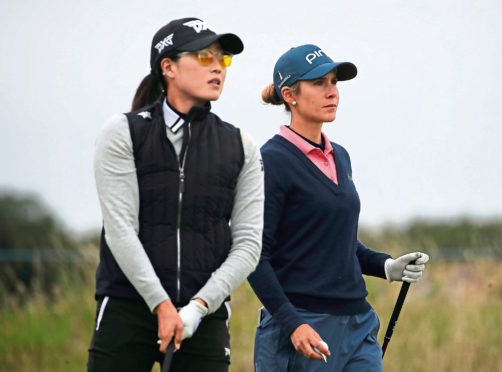The mind wandered a little during the final day of the Ladies Scottish Open at the Renaissance on Sunday, even for those of us supposed to be professionally focused.
During the frequent lengthy gaps between shots among the final group, your scribe started to think of possible songs for Jennifer Song, fitting tunes to hum or even belt out full volume as the American player pondered what appeared to be at least three yardage books and spent an age deciding what to do on the most elementary of shots.
My first thought was “Long, Long, Long” by the Beatles from the White Album, but the pleasantly languid nature of that George Harrison tune wouldn’t help in the primary purpose of the exercise: to stay awake.
Dylan’s “Desolation Row”? Long enough. “Sheep” or “Dogs” from Pink Floyd’s “Animals” are also long enough to fill the gaps, and qualify as even watching grazing sheep or dogs would be more entertaining that watching Song – the TV coverage seemed to concur, occasionally switching to shots of two pups gambolling on Dirleton Beach.
But it’s got to be hummable. “Slow Down” by Selena Gomez? Golfer Niall Horan’s “Slow Hands”? Sorry, not my generation…not even my children’s.
I’d decided on “Goin’ Down Slow” by the immortal Howlin’ Wolf before I asked Stacy Lewis, the winner of the championship in the end and blameless in the ridiculous time it took, what she was singing to herself inbetween shots.
It was Taylor Swift’s “Shake It Off”, the favourite of her two-year-old daughter Chesnee. Ah, new parents: just wait until you hate the music they like.
Stacy humming “haters gonna hate, hate, hate” might have been amusing at the time but this was a serious business; the 35-year-old showed incredible reserves of patience to win out having played for two days with Song and Azahara Munoz.
Lewis protested to a referee about the pace of play without success on the Saturday, and admitted she let it get to her. On Sunday, the refs turned up to time the group when they fell a full hole behind those in front, at the 11th.
Ironically Lewis was affected first, hurrying a couple of shots and taking a double, but long-term it was Song who was most distracted, her championship bid floundering as she went on the clock.
Munoz, who was a little quicker than Song but not much, actually rallied and started to play better when she was being timed. There’s a blatant, obvious lesson there for the Spaniard.
Slow play is of course not confined to the women’s game – far from it. Bryson DeChambeau, Patrick Cantlay, JB Holmes and many others are regular miscreants in the men’s game, and thanks to Edoardo Molinari’s whistle-blowing, we discovered who were the worst offenders on the European Tour last year – Adrian Otaegui, Erik Van Rooyen and Louis Oosthuizen had all been fined.
But the Solheim Cup at Gleneagles was a dreadful example of the slow play problem in the women’s game, somewhat masked by the all-world finish.
A year on nothing seems to have changed in the elite women’s game. Lewis was not afraid to call out players and the LPGA itself for a lack of action – despite all the talk about playing faster, she said, “we’re actually going the other way”.
This week the women’s game is in sharp focus with the AIG Women’s Open at Royal Troon, the first major of the year because of the pandemic.
That championship is now wholly run by the R&A – in the LGU days it was basically run by IMG – and the governing body has been one of the most vocal in decrying slow play.
They’ve done good work to curb it in the amateur game, where it was almost endemic at times well into the last decade. But the amateurs are easy targets, and the R&A have been somewhat less strident at the Open each year.
This being a new, post-lockdown era, the onus is clearly on the R&A to be braver and tougher with the big names.
Anyway, the actual best players in the world – Tiger, Brooks, Rory, DJ, Phil, Stacy, Lydia, Georgia, the Korda sisters – all play at a decent pace. They’re not going to be affected by necessary action.
It’ll probably take a shot penalty in a major to finally make a difference. It’s a big step for the R&A to take, but maybe one where they’ve got to take the hit for the betterment of the game as a whole.
It’s only a name
This week’s championship is now the AIG Women’s Open, the geographic designation “British” removed.
And why not? The rather precious objection to some referring to the men’s version as the British Open – although I would never do such a thing – has always been historically based. It was the Open Championship in 1860, and must always be so, goes the argument.
Whatever. Equally precious is the reaction of (mostly) Americans at us referring to THE Open as such. We don’t call it the US Masters or US PGA (well I don’t) and anyway they seem to think that the “World” Series and the NBA and NFL without geographic pendantry is perfectly okay.
Seriously, call them what you want, it’s just a name.
